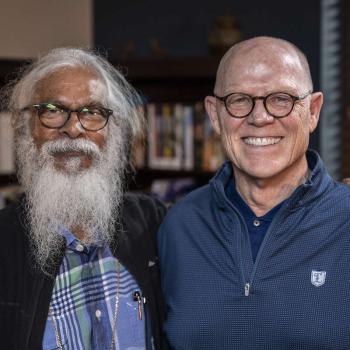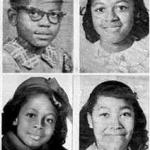Twelve years ago, a conversation with my then-boyfriend turned to the topic of husbands presiding over wives. I couldn't understand why such language was necessary in a relationship of equals. My boyfriend speculated, among other things, that it might simply mean that the man was ultimately more responsible for the family's success than the woman.
We explored that idea for a bit, but the more we talked about it the sicker I felt. As this dark feeling came over me, I first articulated to myself a truth I would later often return to: that I am fully human, fully responsible before God, an agent in my own right, and an equal partner in the truest sense of the word. My future husband would need to see me as such for any marriage to survive. And God must see me as such as well.
As a person who insists on the inherent equality of men and women, I continue to have questions about women's place in Mormon theology and in the structural organization of the Church. Thankfully, I have found in that boyfriend a husband who honors me as equal partner, but women's subordinate position in the LDS Church organization and some teachings is something that, unlike my marriage, I cannot reformulate. I forthrightly admit that like Joanna Brooks, I hope for change. I also rejoice in the questions that my Mormon sisters interested in issues of gender bring to the table. Whether their lynchpin issue is Heavenly Mother, women's ordination, the raising up of women's voices, gender roles, or increased opportunities for women, I affirm the importance of asking these questions.
In this I echo Benedictine nun Sister Joan Chittister, who when asked in an interview about women's roles in the Catholic Church made this reply: "What is going on right now is simply the seeding of the question. It comes down to how many snowflakes does it take to break a branch? I don't know, but I want to be there to do my part if I'm a snowflake. Now, I'm a woman. How many women's voices will it take before we honor the woman's question? I don't know. But I am conscious, and therefore I am responsible."
Like Sister Joan, I feel a deep sense of responsibility to raise my voice, ask my questions, and in so doing, encourage my fellow Mormons to do the same. These are vital issues we raise, ones that have to do with the eternal identity and destiny and worth of half of God's children. While these questions are of such immense weight and importance to me, I have the sinking feeling that the vast majority of members and leaders don't think much about it. But when that branch eventually breaks and the woman's question is seriously addressed and honored by both leaders and members, I have every hope that opportunities for women's contributions will abound, and that our Church family will be all the healthier, all the more vibrant for its breadth and expansiveness.
Seeing my Mormon sisters likewise feel such responsibility to raise their voices and ask their questions evinces to me a healthy vitality. Just as the biblical metaphor of the body of Christ insists on the place and importance of everyone in the Church, I believe in the importance of a multiplicity of Mormon women's voices. There is a robustness, a dynamism, a health in an institution that can accommodate heterodox voices, and that same heterodoxy enriches and adds vitality to the world of Mormon feminism.
Mormon feminist Lorie Winder once articulated to me the importance of a spectrum of voices in the Mormon feminist movement. Because of women like her who advocate for women's ordination and other significant redirections, they have created space for other Mormon feminists to appear moderate and reasonable. She and her cohorts helped define the outer limits of the movement, thus creating space for those in the middle to raise their questions and not be automatically dismissed.
I likewise affirm the position other Mormon women interested in issues of gender take. These are women who may not feel a desire to reformulate the gender hierarchy within the Church or commune with Heavenly Mother, but they attend their church council meetings or board meetings and work on a congregational level to keep in mind the needs of the women. They might not label themselves as such, but I think of these women as stealth feminists, and goodness knows, the Church and Mormon feminism need them and the work they do as much as those who ask the larger questions and advocate for more sweeping changes.
I echo Soper's call for civility and dialogue between Mormons interested in issues of gender. What differences we have come down, I believe, to choices about what aspect of our Mormon theology to emphasize. Some Mormon feminists tend to prioritize ideas about the equality of all souls and the divine nature of every human. Other Mormons might emphasize the primacy of supporting current policies and teachings. These are broad generalizations, of course, but I think they show that whatever our different approaches to our faith, it behooves us all to give one another the benefit of the doubt, to realize that the quest to search out God's will and to live with integrity drives all our various questions and convictions.
For me, the beauty and power of Mormonism rests in its open canon and its belief that any human can approach divinity and come away enriched with revelation. As my friend once said, this is the gospel of progression, and this is the church of progression. Things will change. I only hope that my Mormon sisters and I can contribute graciously and generously to the conversation, as we work to uplift and empower all humans in our fold.
For more responses to Kathryn Soper's As Sisters in Zion, click here.
12/1/2010 5:00:00 AM




